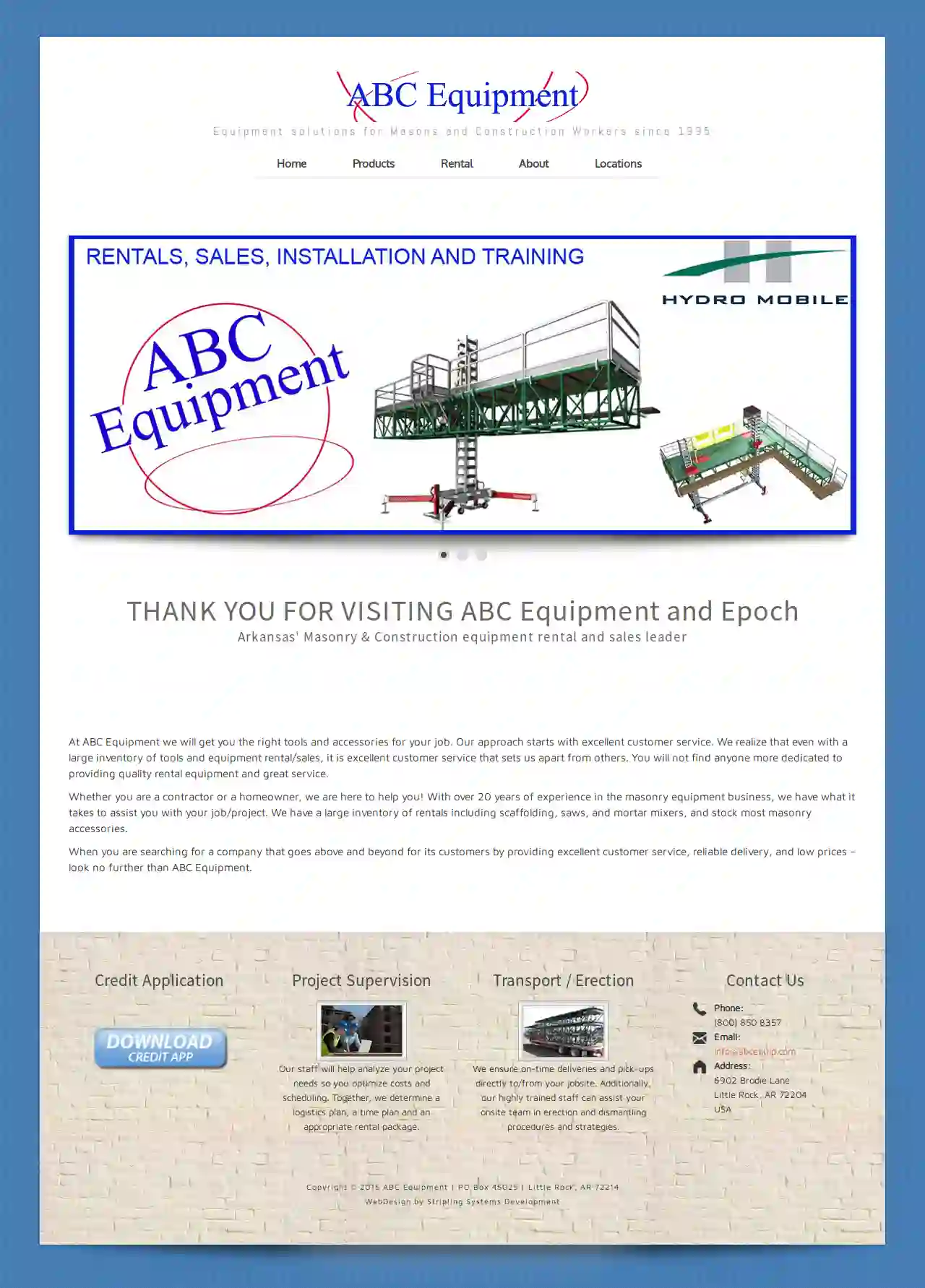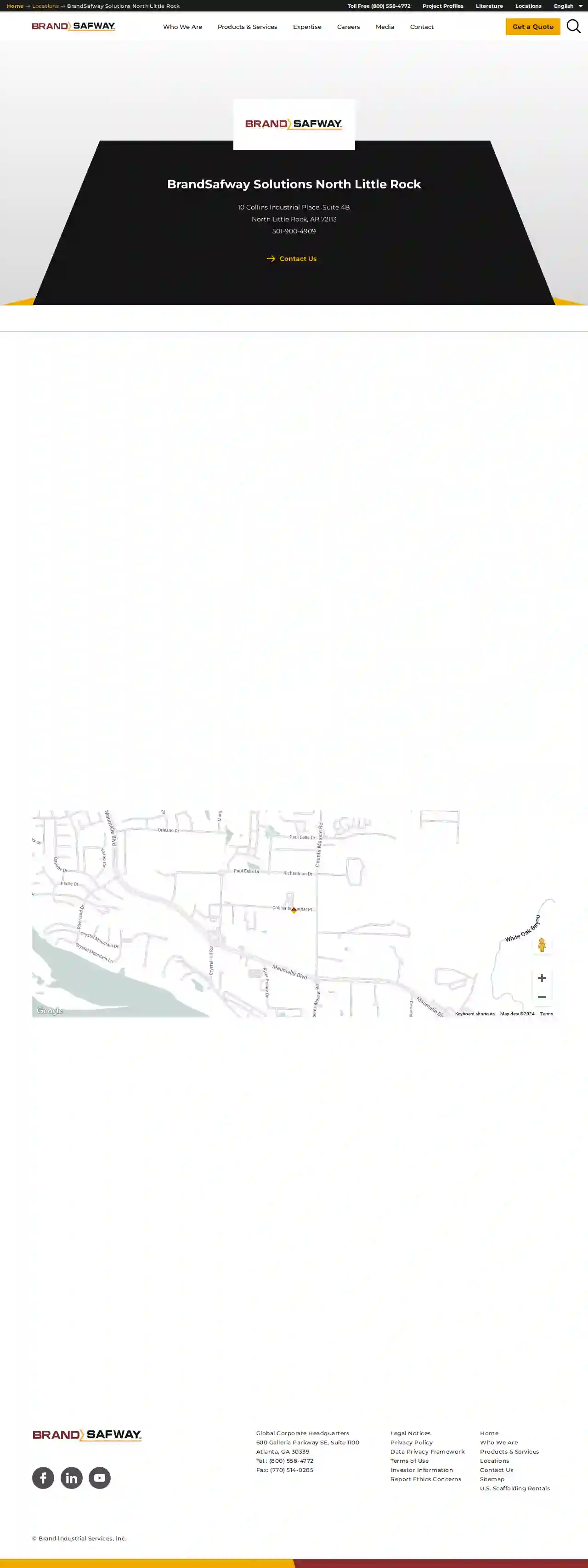Scaffolding Companies Bella Vista
Find Scaffold Services in Bella Vista
Receive multiple Scaffolding Companies quotes for your project today! Compare profiles, reviews, accreditations, portfolio, etc... and choose the best service.

ABC Equipment
4.19 reviews6902 Brodie Lane, Little Rock, 72204, USABC Equipment: Your Partner in Masonry & Construction Since 1995, ABC Equipment has been a trusted provider of equipment solutions for Masons and Construction Workers in Arkansas. We understand the importance of having the right tools for the job, and we're committed to providing our customers with the highest quality equipment and exceptional customer service. Our team is dedicated to helping you succeed. We offer a wide range of rental equipment, including scaffolding, saws, mortar mixers, and a variety of masonry accessories. We also provide project supervision, transportation, and erection services to ensure your project runs smoothly. Whether you're a seasoned contractor or a homeowner tackling a DIY project, ABC Equipment is here to support you. We're proud to offer competitive prices, reliable delivery, and a commitment to exceeding your expectations. We're more than just an equipment rental company; we're your partners in success. Contact us today to learn more about how we can help you achieve your project goals.
- Services
- Why Us?
- Gallery
Get Quote
BrandSafway Solutions North Little Rock
North Little Rock, AR, 1234 Industrial Blvd, 72118, USBrandSafway is a leading provider of access solutions, including scaffolding, aerial work platforms, and forming and shoring. With a strong commitment to safety, quality, and customer satisfaction, BrandSafway offers a wide range of services tailored to meet the unique needs of clients across various industries. Their team of experienced professionals is dedicated to delivering innovative solutions that enhance efficiency and productivity, ensuring successful project outcomes.
- Services
- Why Us?
- Accreditations
- Our Team
- Testimonials
Get Quote- Un
Universal Scaffolding & Equipment
4.33 reviewsLittle Rock, US- Services
- Why Us?
Get Quote - Un
Universal Dock & Door
Little Rock, US- Services
- Why Us?
Get Quote
Over 2,353+ Scaffolding Companies registered
Our scaffolding contractors operate in Bella Vista & beyond!
ScaffoldingHQ has curated and vetted the Best Scaffolding Companies near Bella Vista. Find a reliable contractor today.
Frequently Asked Questions About Scaffolding Companies
- Online Directories: Use specialized directories like ScaffoldingHQ to search for scaffolding companies in your area.
- Search Engines: Use Google or other search engines to search for 'scaffolding companies near me' or 'scaffolding rental [your location]'.
- Local Construction Associations: Contact local construction associations for recommendations.
- Word-of-Mouth Referrals: Ask friends, family, or colleagues for recommendations based on their past experiences.
- Stability and Level: The scaffolding is level and firmly supported by a solid foundation.
- Secure Connections: All components (tubes, clamps, fittings) are properly connected and tightened.
- Guardrails and Toeboards: Adequate guardrails and toeboards are in place to prevent falls.
- Platforms and Decking: Platforms are secure, free from damage, and provide adequate working space.
- Access and Egress: Safe access and exit points are available (ladders, stairs).
- Weather Protection: Appropriate measures are in place to protect workers from adverse weather conditions (e.g., wind screens, covers).
- Clearance from Hazards: The scaffolding is a safe distance from power lines, trees, or other potential hazards.
- Scaffolding Tag: The scaffolding tag is up-to-date and displays the last inspection date, maximum load capacity, and any restrictions.
- Steel: The most common material due to its strength, durability, and resistance to corrosion.
- Aluminum: Lighter than steel, often used for smaller projects or where weight is a concern.
- Timber: Used for decking platforms and some traditional scaffolding structures. It's less common now due to its susceptibility to rot and damage.
- Fiberglass: Used in specialized applications where electrical conductivity is a concern.
- Traditional and highly versatile.
- Components (tubes, clamps, boards) are assembled on-site.
- Adaptable to complex shapes and structures.
- Requires skilled labor and more time for erection.
- Pre-engineered, modular components.
- Faster and easier to erect.
- Often has higher load capacities.
- May be less versatile for complex shapes.
How can I find scaffolding companies near me?
What should I look for during a scaffolding inspection?
What are some common materials used in scaffolding?
What is the difference between tube and clamp scaffolding and system scaffolding?
Tube and Clamp Scaffolding:
How can I find scaffolding companies near me?
- Online Directories: Use specialized directories like ScaffoldingHQ to search for scaffolding companies in your area.
- Search Engines: Use Google or other search engines to search for 'scaffolding companies near me' or 'scaffolding rental [your location]'.
- Local Construction Associations: Contact local construction associations for recommendations.
- Word-of-Mouth Referrals: Ask friends, family, or colleagues for recommendations based on their past experiences.
What should I look for during a scaffolding inspection?
- Stability and Level: The scaffolding is level and firmly supported by a solid foundation.
- Secure Connections: All components (tubes, clamps, fittings) are properly connected and tightened.
- Guardrails and Toeboards: Adequate guardrails and toeboards are in place to prevent falls.
- Platforms and Decking: Platforms are secure, free from damage, and provide adequate working space.
- Access and Egress: Safe access and exit points are available (ladders, stairs).
- Weather Protection: Appropriate measures are in place to protect workers from adverse weather conditions (e.g., wind screens, covers).
- Clearance from Hazards: The scaffolding is a safe distance from power lines, trees, or other potential hazards.
- Scaffolding Tag: The scaffolding tag is up-to-date and displays the last inspection date, maximum load capacity, and any restrictions.
What are some common materials used in scaffolding?
- Steel: The most common material due to its strength, durability, and resistance to corrosion.
- Aluminum: Lighter than steel, often used for smaller projects or where weight is a concern.
- Timber: Used for decking platforms and some traditional scaffolding structures. It's less common now due to its susceptibility to rot and damage.
- Fiberglass: Used in specialized applications where electrical conductivity is a concern.
What is the difference between tube and clamp scaffolding and system scaffolding?
Tube and Clamp Scaffolding:
- Traditional and highly versatile.
- Components (tubes, clamps, boards) are assembled on-site.
- Adaptable to complex shapes and structures.
- Requires skilled labor and more time for erection.
- Pre-engineered, modular components.
- Faster and easier to erect.
- Often has higher load capacities.
- May be less versatile for complex shapes.